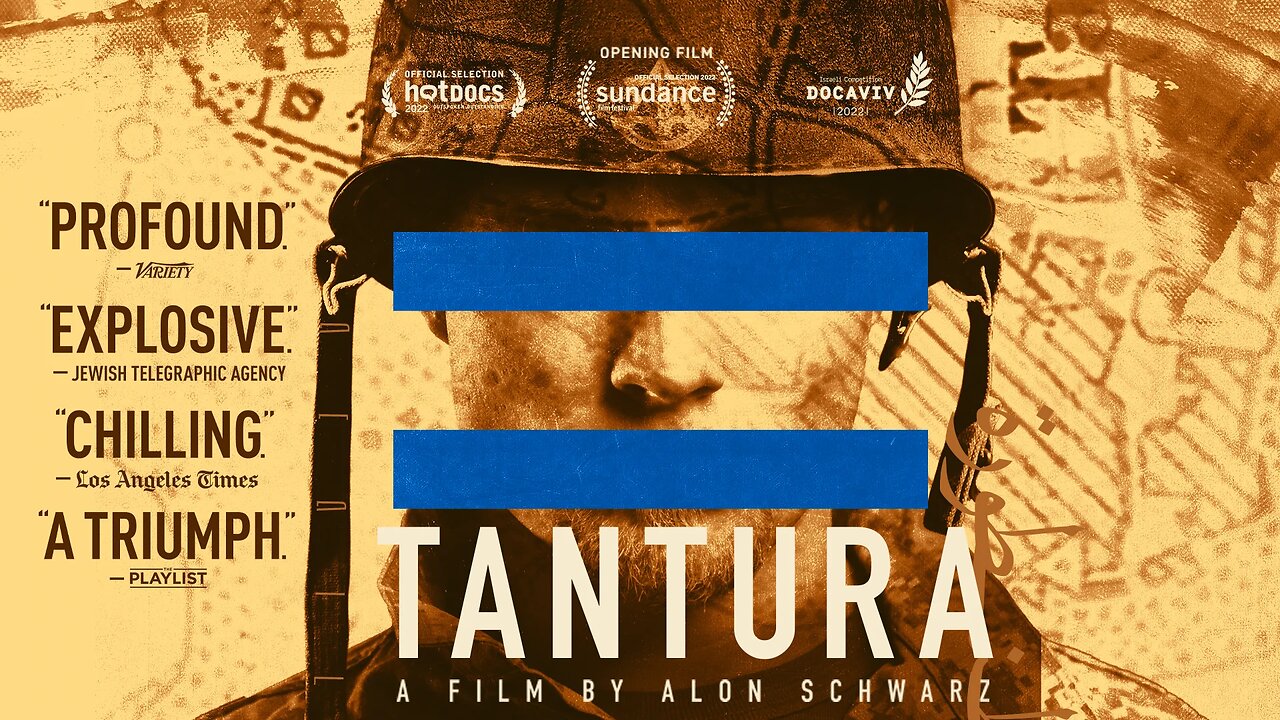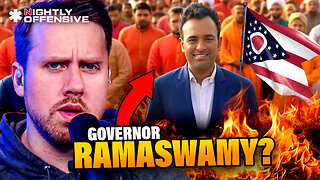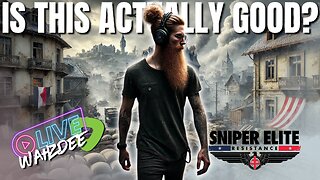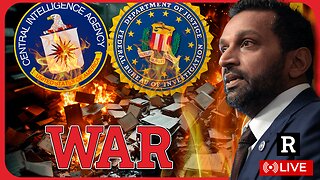Premium Only Content

Tantura (2022)
In the war of 1948 hundreds of Palestinian villages were depopulated. Israelis call it 'The War of Independence', Palestinians call it 'Nakba"'.
The film examines one village - Tantura and why "Nakba" is taboo in Israeli society.
The tape-recorded words “erase it” take on new weight in the context of history and war. When the state of Israel was established in 1948, war broke out and hundreds of Palestinian villages were depopulated in its aftermath. Israelis know this as the War of Independence. Palestinians call it “Nakba” (the Catastrophe). In the late 1990s, graduate student Teddy Katz conducted research into a large-scale massacre that had allegedly occurred in the village of Tantura in 1948. His work later came under attack and his reputation was ruined, but 140 hours of audio testimonies remain.
__________________________________
Sundance 2022 #1
Review by Benjamin Choate: ★★★★
"Of course everyone knew. Everyone knew."
Tantura begins incredibly slowly. We are introduced to far too many different people to possibly keep up with; an unbalanced blend of elderly veterans, professors, scholars, lawyers, witnesses, and civilians. Each person speaks in ways unrelated to the others, and for a time it seems to be entirely unfocused and repetitive.
But then you begin to realize.
It's not entirely apparent at first, but slowly you begin to see it in the nuances of the soldier's tone of voice, or perhaps in their nervous laughter. You slowly start to understand an undertone of discomfort in certain people being interviewed, in the way they subtly change with certain phrases or buzzwords. It's invisible, yet communicated quite clearly: there's something going on here that they do not want you to know about.
That something takes the embodiment of Teddy Katz, who faced years of academic disgrace and violent threats following the media attention that his thesis received, on his conclusion of a massacre occurring in the village of Tantura in 1948 during the "War of Independence" (though Palestinians call it “Nakba”, the Catastrophe). His 140 hours of tapes and extensive research were quickly disregarded by the courts, and his academic career was swiftly ended. However, these tapes were never played at his trial (where he was sued for defamation by many of the elderly veterans interviewed in the film). Despite being labeled as an enemy of the state by many, all he did was interview around 360 people (half of which were Jewish, half Arab). He explains that while it is entirely reasonable for each individual to remember the days of May 22-23rd differently, a logical and conclusive timeline can be created based on the consistencies between the hundreds of testimonies. From this, he finds the truth that will destroy his professional life: that hundreds of Palestinians (most of which were unarmed young men) were massacred AFTER the village had surrendered (which is to say, after their village had been looted and utterly ravaged). He has been shown a sliver of what many have tried to conceal; the overarching reality that Israel's history is one of ethnic cleansing and ongoing tragedy.
But the film does not assume we know this, or that we are on Katz's side. Indeed, for the majority of the film, Katz is merely the catalyst rather than the protagonist; his screentime is matched if not outweighed by the testimonies of the veterans either actively involved in or a witness to the Tantura massacre. Like with Katz's tapes, each interview seems to bring a new set of conflicting information. Nearly every cut brings contradictory statements, with even people arguing the same point seeming to go about it through different reasonings and recollections. In fact, the only consistency for the majority of the soldiers' testimonies is their mysterious collective failed memory regarding that specific day in Tantura. They don't remember, and most openly admit that they don't want to. Some openly discuss their war crimes, even laughing about it. "I didn't take captives", one explained, speaking in a casual tone completely removed from the words exiting his mouth. This stretches into a larger portrait the film begins to paint, one that begins to show a complete disregard for the objective history of Isreal's past and its consequences. Most of the soldiers interviewed were of course not directly involved in the massacre, of course most of them didn't actually pull the trigger in Tantura. But it reflects the passive stance of the dark side of the Zionist project, the complacency in the bystander through the belief that it must be justified. "No one was murdered", they repeat. "There was no massacre". Perhaps worse than the outright deniers are the ones that cannot deny it. Another stance still: "It happened. What can you do, it happened".
"I saw it and I moved along, that's all."
I think the reason that the film is presented in such a dense and repetitive way of showing conflicting testimony after testimony is that we experience the film in a similar way that Teddy Katz experienced his interviews for his thesis, or even that director Alon Schwarz experienced in researching for this very film. We're presented with so many perspectives not so that we can draw our "own" conclusion, but so that we see the cross-references being made for ourselves; so that subconsciously we are connecting the dots and seeing through the contradictions. In real time, we understand what is propaganda and what is meant to be truth. Because really, the film isn't about whether or not there was a massacre in Tantura. There was, and they know that history will one day view this as non-disputable. Before any work can be done for the future, the past must first be accepted. Tantura is simply the focus; the reality is that hundreds of other Palestinian villages met the same fate as Tantura. This massacre isn't a rogue occurrence, it is a microcosm of the still ongoing plight of the descendants of the 750,000 Palestinians who survived to become "refugees" (victims of Isreal's ongoing imperial persecution and unpunished war crimes). No, this film is about the way this specific but far from isolated massacre was discarded from history; how the narratives were written around it in order to maintain an agenda of a moral and pure Israeli identity that never really existed. Each war crime can be explained away, all the murders can simply be paved over, all because no one questioned it, or perhaps the much scarier alternative:
because no one wanted to.
__________________________________
Review by lilcultdancer ★★★★
as an Indigenous person watching this all i gotta say is Fuck Colonizers.
but as a serious person interested in history i want to say that this well researched, jaw dropping and …. this is also not in the past. this is very much still real. and again fuck colonizers
__________________________________
Review by bummer_buddy ★★★★★
One of the most bone chilling documentaries I’ve ever seen. Not just a documentary of the 1948 occupation of Palestine, but an actual first hand document of the massacre of Tantura. This is on the internet archive, I really encourage everyone to watch it if you’re interested in the history of Israel. Fantastic journalism and a really well made film.
__________________________________
Review by gaul_blatter ★★★★
Very interesting, highly informative watch. Watched this in a screening organized by the local Justice for Palestinians chapter. It’s notable that this is a fully Israeli production, which makes me wonder what kind of footage had to be left on the cutting room floor. Highly recommend this to anyone looking to become more familiar with the events of the Nakba. But I will say, this is not by any means an anti-Zionist film. The perspective of the director seems to be that the Zionist project is legitimate, but had a dark chapter that it has to come clean from. I think it’s hard to look at today’s news and then view the events of Tantura as an isolated chapter of Israel’s history, as this is clearly very much ongoing.
__________________________________
-
 DVR
DVR
Slightly Offensive
10 hours ago $0.81 earnedGOV. RAMASWAMY? Vivek to import 1 BILLION INDIANS to OHIO | Nightly Offensive
82.1K48 -
 4:51:08
4:51:08
Wahzdee
13 hours agoSniper Elite Then Extraction Games—No Rage Challenge! 🎮🔥 - Tuesday Solos
64.5K3 -
 2:12:58
2:12:58
Robert Gouveia
13 hours agoSenator's Wife EXPOSED! Special Counsel ATTACKS; AP News BLOWN OUT
108K41 -
 55:07
55:07
LFA TV
1 day agoDefending the Indefensible | TRUMPET DAILY 2.25.25 7PM
33.7K14 -
 6:09:26
6:09:26
Barry Cunningham
19 hours agoTRUMP DAILY BRIEFING - WATCH WHITE HOUSE PRESS CONFERENCE LIVE! EXECUTIVE ORDERS AND MORE!
86K50 -
 1:46:37
1:46:37
Game On!
14 hours ago $7.27 earnedPUMP THE BRAKES! Checking Today's Sports Betting Lines!
96.8K4 -
 1:27:21
1:27:21
Redacted News
13 hours agoBREAKING! SOMETHING BIG IS HAPPENING AT THE CIA AND FBI RIGHT NOW, AS KASH PATEL CLEANS HOUSE
240K245 -
 1:08:28
1:08:28
In The Litter Box w/ Jewels & Catturd
1 day agoCrenshaw Threatens Tucker | In the Litter Box w/ Jewels & Catturd – Ep. 749 – 2/25/2025
116K57 -
 44:57
44:57
Standpoint with Gabe Groisman
1 day agoWill Byron Donalds Run for Florida Governor? With Congressman Byron Donalds
60.8K10 -
 1:06:25
1:06:25
Savanah Hernandez
13 hours agoEXPOSED: FBI destroys evidence as NSA’s LGBTQ sex chats get leaked?!
81.9K30